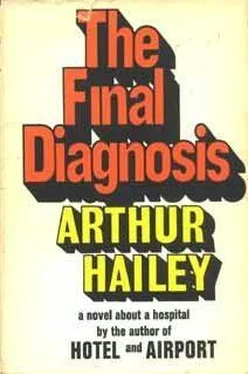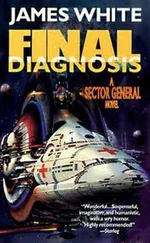Arthur Hailey - The Final Diagnosis
Здесь есть возможность читать онлайн «Arthur Hailey - The Final Diagnosis» весь текст электронной книги совершенно бесплатно (целиком полную версию без сокращений). В некоторых случаях можно слушать аудио, скачать через торрент в формате fb2 и присутствует краткое содержание. Жанр: Триллер, на английском языке. Описание произведения, (предисловие) а так же отзывы посетителей доступны на портале библиотеки ЛибКат.
- Название:The Final Diagnosis
- Автор:
- Жанр:
- Год:неизвестен
- ISBN:нет данных
- Рейтинг книги:4 / 5. Голосов: 1
-
Избранное:Добавить в избранное
- Отзывы:
-
Ваша оценка:
- 80
- 1
- 2
- 3
- 4
- 5
The Final Diagnosis: краткое содержание, описание и аннотация
Предлагаем к чтению аннотацию, описание, краткое содержание или предисловие (зависит от того, что написал сам автор книги «The Final Diagnosis»). Если вы не нашли необходимую информацию о книге — напишите в комментариях, мы постараемся отыскать её.
The Final Diagnosis — читать онлайн бесплатно полную книгу (весь текст) целиком
Ниже представлен текст книги, разбитый по страницам. Система сохранения места последней прочитанной страницы, позволяет с удобством читать онлайн бесплатно книгу «The Final Diagnosis», без необходимости каждый раз заново искать на чём Вы остановились. Поставьте закладку, и сможете в любой момент перейти на страницу, на которой закончили чтение.
Интервал:
Закладка:
Lucy let the intern move in to sew the subcutaneous tissue. She told him, “Use interrupted sutures; three should be sufficient.” She watched closely. He was being slow but careful. She knew some of the surgeons at Three Counties gave interns very little to do when they were assisting. But Lucy remembered how many times she herself had stood by an operating table, hoping for at least a little practice in tying knots.
That had been in Montreal—all of thirteen years ago since she had begun her internship at Montreal General, then stayed on to specialize in orthopedic surgery. She had often thought how much chance there was in the specialty which anyone in medicine decided to enter. Often so much depended on the kind of cases you became involved in as an intern. In her own case, in pre-med school at McGill, and later at Toronto University School of Medicine, her interest had switched first to one field, then to another. Even on return to Montreal she had been undecided whether to specialize at all or enter general practice. But then chance had caused her to work for a while under the tutelage of a surgeon known to the hospital generally as “Old Bones,” because of his concern with orthopedics.
When Lucy first knew him, Old Bones had been in his mid-sixties. In terms of behavior and personality, he was one of the most objectionable people she had ever met. Most teaching centers have their prima donnas; in Old Bones the worst habits of them all had appeared to be combined. He regularly insulted everyone in the hospital—interns, residents, his own colleagues, patients—with equal impartiality. In the operating room, if crossed at all, he had shouted abuse at nurses and assistants in language borrowed from the barroom and the water front. If handed a wrong instrument, on his normal days he would throw it back at the offender; in a more tolerant mood he would merely hurl it at the wall.
Yet, for all the performance, Old Bones had been a master surgeon. He had worked mostly on correcting bone deformities in crippled children. His spectacular successes had made his fame world-wide. He never modified his manner, and even the children he dealt with got the same rough treatment as their elders. But, somehow, children seldom seemed to fear him. Lucy had often wondered if childish instinct were not a better barometer than adult reasoning.
But it was the influence of Old Bones that really decided Lucy’s future. When she had seen at first hand what orthopedic surgery could accomplish, she had wanted to share the accomplishment herself. She had stayed at Montreal General as a three-year intern, assisting Old Bones whenever it was possible. She had copied everything from him except his manner. Even toward Lucy that had never changed, though near the end of her senior internship she took pride in the fact that he had shouted at her a good deal less than at other people.
Since then, in the time she had been in practice, Lucy had had successes of her own. And in Burlington her referrals from other physicians nowadays made her one of the busiest people on Three Counties’ staff. She had gone back to Montreal only once—on an occasion two years earlier, to attend Old Bones’ funeral. People said it was one of the biggest funerals of a medical man the city had ever seen. Practically everyone the old man had ever insulted had been present in the church.
Her mind switched back to the present. The biopsy was almost complete. At a nod from Lucy the intern had gone on to sew up the skin, again using interrupted sutures. Now he was putting in the final one. Lucy glanced at the wall clock above her. The whole procedure had taken half an hour. It was 3 p.m.
At seven minutes to five a sixteen-year-old hospital messenger sashayed, whistling, hips swaying, into the serology lab. Usually he came in this way because he knew it infuriated Bannister, with whom he maintained a state of perpetual running warfare. As usual, the senior lab technician looked up and snarled at him. “I’m telling you for the last time to stop making that infernal racket every time you come in here.”
“I’m glad it’s the last time.” The youth was unperturbed. “Tell you the truth, all that complainin’ o’ yours was get’n on my nerves a bit.” He went on whistling and held up the tray of blood samples he had collected from the outpatients’ lab. “Where you want this blood, Mr. Dracula?”
John Alexander grinned. Bannister, however, was not amused. “You know where it goes, wise guy.” He indicated a space on one of the lab benches. “Put it over there.”
“Yessir, captain, sir.” Elaborately the youth put down the tray and gave a mock salute. Then he essayed a pelvic gyration and moved toward the door singing:
“Oh, give me a home where the viruses roam,
Where the bugs and the microbes all play,
When often is heard an old bloodsucker’s word,
And the test tubes stand stinkin’ all day.”
The door swung closed and his voice faded down the corridor.
Alexander laughed. Bannister said, “Don’t laugh at him. It just makes him worse.” He crossed to the bench and picked up the blood specimens, glancing casually at the work sheet with them. Halfway across the lab he stopped.
“Hey, there’s a blood sample here from a Mrs. Alexander. Is that your wife?”
Alexander put down the pipette he had been using and moved across. “It probably is. Dr. Dornberger sent her in for a sensitivity test.” He took the work sheet and looked down it. “Yes, it’s Elizabeth all right.”
“It says typing and sensitivity both,” Bannister said.
“I expect Dr. Dornberger wanted to be sure. Actually Elizabeth is Rh negative.” As an afterthought he added, “I’m Rh positive.”
Expansively, and with a fatherly air of great knowledge, Bannister said, “Oh well, most of the time that doesn’t cause any trouble.”
“Yes, I know. All the same, you like to be sure.”
“Well, here’s the specimen.” Bannister picked out the test tube labeled “Alexander, Mrs. E.” and held it up. “Do you want to do the test yourself?”
“Yes, I would. If you don’t mind.”
Bannister never objected to someone else doing work which might otherwise fall to himself. He said, “It’s all right with me.” Then, glancing at the clock, he added, “You can’t do it tonight though. It’s quitting time.” He replaced the test tube and handed the tray to Alexander. “Better put this lot away until the morning.”
Alexander took the blood samples and put them in the lab refrigerator. Then, closing the refrigerator door, he paused thoughtfully.
“Carl, there’s something I’ve been meaning to ask you.”
Bannister was busily clearing up. He always liked to leave right on the dot of five. Without turning his head he asked, “What is it?”
“The blood-sensitization tests we’re doing here—I’ve been wondering about them.”
“Wondering what?”
Alexander chose his words carefully. Right from the beginning, because of his own college training, he had realized the possibility of arousing resentment in people like Bannister. He tried now, as he had before, to avoid giving offense. “I noticed we’re only doing two sensitization tests—one in saline, the other in high protein.”
“So?”
“Well,” Alexander said diffidently, “isn’t just doing the two tests alone . . . a bit out of date?”
Bannister had finished clearing up. He came around the center table, wiping his hands on a paper towel. He said sharply, “Suppose you tell me why.”
Alexander ignored the sharpness. This was important. He said, “Most labs nowadays are doing a third test—an indirect Coombs—after the test in saline.”
“A ‘what’ test?”
“An indirect Coombs.”
“What’s that?”
Читать дальшеИнтервал:
Закладка:
Похожие книги на «The Final Diagnosis»
Представляем Вашему вниманию похожие книги на «The Final Diagnosis» списком для выбора. Мы отобрали схожую по названию и смыслу литературу в надежде предоставить читателям больше вариантов отыскать новые, интересные, ещё непрочитанные произведения.
Обсуждение, отзывы о книге «The Final Diagnosis» и просто собственные мнения читателей. Оставьте ваши комментарии, напишите, что Вы думаете о произведении, его смысле или главных героях. Укажите что конкретно понравилось, а что нет, и почему Вы так считаете.












